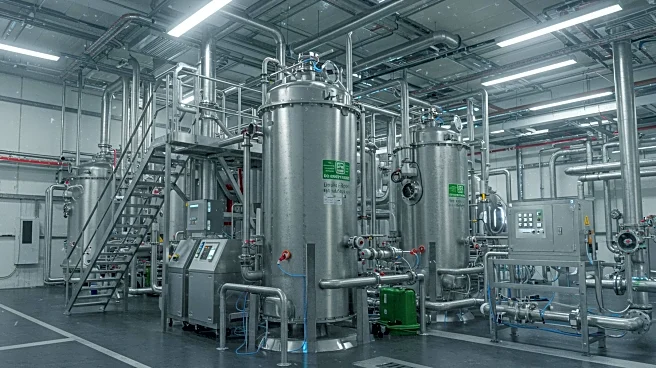What's Happening?
Syngenta has inaugurated a new production facility in South Carolina, designed to manufacture up to 16,000 tons of biostimulants annually. This expansion significantly increases Syngenta's capacity in the U.S. market, aligning with the growing demand for sustainable farming solutions. The facility is part of Syngenta's broader strategy to enhance its biologicals research and development pipeline, following recent acquisitions such as Intrinsyx Bio and the integration of Novartis' Strains and Natural Products Collection. These moves aim to bolster Syngenta's repository of genetic resources and accelerate the development of nature-inspired biological solutions.
Why It's Important?
The expansion of Syngenta's production capabilities in the U.S. reflects the increasing demand for agricultural biologicals, driven by the need for sustainable farming practices. As farmers seek alternatives to synthetic fertilizers and pesticides, biostimulants offer a viable solution to improve crop yield and resilience against pests and climate stress. This shift is supported by government initiatives promoting organic and eco-friendly farming practices. The facility's opening is expected to strengthen Syngenta's position in the U.S. market, catering to the rising consumer preference for organic food and residue-free produce.
What's Next?
Syngenta's strategic expansion is likely to influence the agricultural biologicals market by encouraging further adoption of bio-based inputs among U.S. farmers. The company's increased production capacity may lead to more competitive pricing and wider availability of biostimulants, potentially accelerating the transition to sustainable farming practices. As the market grows, other agri-tech companies may also invest in expanding their biologicals offerings, fostering innovation and collaboration in the sector.
Beyond the Headlines
The shift towards agricultural biologicals highlights broader environmental and health concerns associated with traditional farming methods. As awareness of soil health, biodiversity, and food safety increases, the adoption of biological solutions may contribute to long-term improvements in agricultural sustainability. This trend could also influence regulatory frameworks, encouraging more stringent standards for synthetic inputs and promoting research into alternative farming technologies.











